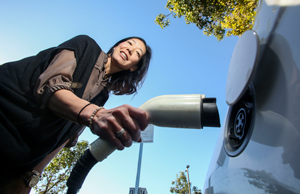
Southern California Edison wants to jump-start the region’s electric car market.
The Rosemead-based utility has launched a $22 million pilot program, dubbed Charge Ready, to install 1,500 electric charging stations throughout Southern California. Installations will likely start this fall, pending approval from the California Public Utilities Commission, and will see chargers placed at locations where cars are parked for extended periods of time, such as workplaces, campuses, and apartment complexes.
“As more charging stations are available, people will become more comfortable with buying electric cars,” said Caroline Choi, Edison’s vice president for energy and environmental policy.
One of Edison’s goals is to expand the number of stations in apartments, which it views as an underserved sector in the charging infrastructure.
That could prompt more people who live in those buildings to buy electric cars, said J.R. DeShazo, director of the Luskin Center for Innovation at UCLA.
“There are approximately 48,000 electric vehicles in the county, said DeShazo. “Almost all of those vehicles are owned by households who live in single-family residences,” he explained, noting that residents of multiunit buildings are less likely to be in the market for such cars due to the lack of in-building charging stations.
If the pilot program is well-received by consumers, Edison will increase the number of charging stations throughout the region to about 30,000 at an estimated cost of $355 million.
Other utilities in California have similar plans. Sacramento’s Pacific Gas and Electric Co. is awaiting approval for a reported $160 million proposal to install 7,600 charging stations in Northern California. And in January, the CPUC approved a $45 million plan from San Diego Gas & Electric to place 3,500 electric vehicle chargers at 350 sites.
Edison has estimated the construction cost to run wiring to a charging station area, including trenching concrete within a parking structure and laying wire, would be about $8,600. A spokesman for the utility declined to comment on additional costs, such as the price of charging station equipment and grid hookup.
As part of the Charge Ready program, Edison would share the installation cost with the property owner, with the utility covering 25 percent to 100 percent of the cost, with owners in disadvantaged neighborhoods getting the full discount.
Placement of charging stations would depend on demand from building owners, who will be able to apply to participate in the program in the coming months. Rate discounts are available for charging cars at night, and for specially metered electric lines dedicated to EV charging. Those meters can cost $1,500 and up, but offer a lower rate compared with standard usage meters.
Public versus private
The average installation and equipment cost for a dual-charging station, which charge two cars simultaneously, on the private market is $6,000, according to Jonah Teeter-Balin, director of product marketing at AeroVironment Inc., a Monrovia manufacturer of electric charging stations that is best known for its unmanned aerial vehicles, or drones.
But he said installing charging stations in multifamily units and office buildings made of concrete is often more difficult and costly.
“The installation cost on average is more expensive when you have to pour concrete, trench concrete, and lay wiring,” said Teeter-Balin, making Edison’s cost-sharing offer enticing to owners wary of high upfront costs.
It may be a high bar to get over.
Dan Tenenbaum, founding principal of Brentwood residential investor Pacific Crest Realty, said that an $8,600 investment might not attract a resident who wouldn’t rent otherwise, but added that the subsidy could very well make the difference for the owner to install the charging station or not.
On the commercial side, the Edison initiative dovetails with a trend toward making electric car charging stations available to tenants. For example, PCT, a set of three buildings in El Segundo, has installed eight stations serving about 80 electric cars in its 4,900-spot parking garage.
“With all commercial buildings, you almost have to put them in to be competitive with everyone else,” said Bill Lewis, a director at Westwood-based CBRE Group Inc., which manages the buildings. “We’ve tried to attract a more creative clientele. We feel … they are more interested in EV chargers and electric vehicles, so we are trying to have those available for them.”
Yet there is doubt as to whether it makes financial sense for utilities to pay for the charging stations. Consumer groups have opposed similar plans put forward by other state utilities as an unfair burden on ratepayers, and critics have suggested that stations might not get the usage needed to repay equipment and installation costs.
Short-lived?
Moreover, rapidly advancing charging technology could also shorten the usefulness of existing stations, said John DeCicco, a research professor at University of Michigan Energy Institute.
“Those (charging stations) are going to be stranded investments,” he said. “They will be obsolete in a decade.”
There are other market forces to consider as well. Lower gasoline prices pushed electric car sales down 17 percent in the United States last year to 102,600 vehicles, according to an estimate by consulting firm Autodata of the United Kingdom.
DeShazo of UCLA’s Luskin Center also said it’s difficult to generate a return on investment in electric car charging stations.
“It’s really hard to make a financial profit on these stations,” he said. “Though, there are other social and environmental benefits. A lot hinges on getting utilization rates as high as could possibly be.”
Edison is betting that its plan will help do exactly that.
“We are hoping by building this awareness, people will take an interest and buy an electric vehicle,” said Edison’s Choi. “If someone buys an electric vehicle, they are sold on it. It’s quiet, it’s a smooth ride and they love it.”
